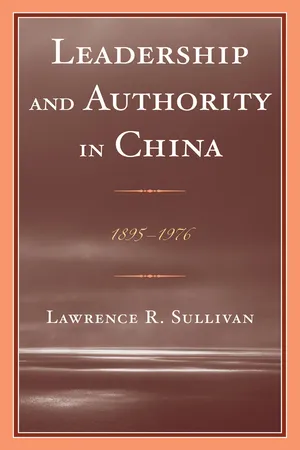
- English
- ePUB (mobile friendly)
- Available on iOS & Android
eBook - ePub
About this book
This volume presents elite conflicts and political controversies in China from 1895 to 1978 as rooted in two diametrically opposed visions of leadership and political authority: a radical, charismatic model that instills absolute authority in the single leader whose "will" guides the polity and whose "word" is the basis of policy formulation, versus an institutional model in which authority inheres in organization and where "collective" leadership and decision-making govern the political realm. The former model in modern Chinese history entailed a "leader principle" and personality cult that began with Sun Yatsen and Chiang Kaishek in the Nationalist Party (KMT) and reached its peak with the leadership cult of Chinese Communist Party (CCP) Chairman Mao Zedong, especially during the 1966-1976 Great Proletarian Cultural Revolution. The latter model with its emphasis on "collective leadership" (jiti lingdao) and "administrative rationalism" began as a reaction among early members of the CCP against the promotion of the Sun and Chiang leadership cults and became a central governing principle in the Communist Party that served as official leadership doctrine beginning with the formation of the Party in 1921.
While tensions over leadership issues were relatively muted in the pre-1949 period and early 1950s of CCP history as an apparent "compromise" was reached in which from 1943 onward a cult of the leader was promoted for propaganda purposes but with collegial decision-making governing inner Party decision-making, the mid-to-late 1950s saw this "compromise" among the top leadership come under increasing strain and finally break down. Devoted to a fundamentally different vision of a "socialist" China from other top leaders on a number of economic, social, and political fronts, Mao Zedong pushed his domination of the policy process that ultimately provoked a wholesale assault on the CCP apparatus throughout the country while the leader cult reached mythic proportions during the Cultural Revolution. Confronted by the possibility of civil war and generally opposed to the takeover of the polity by the radical Gang of Four led by his wife Jiang Qing, by the mid-1970s the aging great leader acquiesced to the rebuilding of the CCP along traditional, "institutional" lines.
While tensions over leadership issues were relatively muted in the pre-1949 period and early 1950s of CCP history as an apparent "compromise" was reached in which from 1943 onward a cult of the leader was promoted for propaganda purposes but with collegial decision-making governing inner Party decision-making, the mid-to-late 1950s saw this "compromise" among the top leadership come under increasing strain and finally break down. Devoted to a fundamentally different vision of a "socialist" China from other top leaders on a number of economic, social, and political fronts, Mao Zedong pushed his domination of the policy process that ultimately provoked a wholesale assault on the CCP apparatus throughout the country while the leader cult reached mythic proportions during the Cultural Revolution. Confronted by the possibility of civil war and generally opposed to the takeover of the polity by the radical Gang of Four led by his wife Jiang Qing, by the mid-1970s the aging great leader acquiesced to the rebuilding of the CCP along traditional, "institutional" lines.
Frequently asked questions
Yes, you can cancel anytime from the Subscription tab in your account settings on the Perlego website. Your subscription will stay active until the end of your current billing period. Learn how to cancel your subscription.
No, books cannot be downloaded as external files, such as PDFs, for use outside of Perlego. However, you can download books within the Perlego app for offline reading on mobile or tablet. Learn more here.
Perlego offers two plans: Essential and Complete
- Essential is ideal for learners and professionals who enjoy exploring a wide range of subjects. Access the Essential Library with 800,000+ trusted titles and best-sellers across business, personal growth, and the humanities. Includes unlimited reading time and Standard Read Aloud voice.
- Complete: Perfect for advanced learners and researchers needing full, unrestricted access. Unlock 1.4M+ books across hundreds of subjects, including academic and specialized titles. The Complete Plan also includes advanced features like Premium Read Aloud and Research Assistant.
We are an online textbook subscription service, where you can get access to an entire online library for less than the price of a single book per month. With over 1 million books across 1000+ topics, we’ve got you covered! Learn more here.
Look out for the read-aloud symbol on your next book to see if you can listen to it. The read-aloud tool reads text aloud for you, highlighting the text as it is being read. You can pause it, speed it up and slow it down. Learn more here.
Yes! You can use the Perlego app on both iOS or Android devices to read anytime, anywhere — even offline. Perfect for commutes or when you’re on the go.
Please note we cannot support devices running on iOS 13 and Android 7 or earlier. Learn more about using the app.
Please note we cannot support devices running on iOS 13 and Android 7 or earlier. Learn more about using the app.
Yes, you can access Leadership and Authority in China by Lawrence Sullivan in PDF and/or ePUB format, as well as other popular books in Politique et relations internationales & Histoire du 20ème siècle. We have over one million books available in our catalogue for you to explore.
Information
Table of contents
- List of Abbreviations
- Foreword
- Acknowledgments
- Introduction
- Chapter 1 The Problem of “Feudal Despotism” In Marxand China
- Chapter 2 Intellectual and Political Controversies Over Authority: 1895-1922
- Chapter 3 Political Authority in the Chinese Communist Party, Theory and Pratice: 1921-1949
- Chapter 4 The Struggle Over Leadership and Authority in the CCP, I: 1949-1959
- Chapter 5 The Struggle Over Leadership and Authority in the CCP, II: 1959-1976
- Chapter 6 Epilogue: On the “Question of Mao”
- Conclusion
- Bibliography
- About the Author